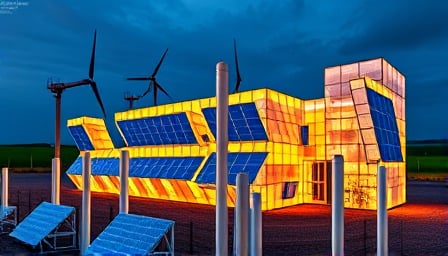Corporate News Analysis
RWE AG’s Recent Market Performance
RWE AG, one of Europe’s preeminent energy utilities, has recorded a modest but noteworthy uptick in its share price, rising 1.56 % to approximately €38.41 per share. The firm’s valuation has attracted unanimous positive sentiment from market analysts, with a 100 % “buy” consensus among the eleven experts surveyed. The consensus target price of €42.77 represents an estimated upside of roughly 5 % relative to the current trading level.
This incremental performance is a reflection of several reinforcing factors:
- Renewable Energy Expansion – The company’s continued investment in clean generation, particularly wind and solar, aligns with EU decarbonisation mandates and the broader shift toward low‑carbon portfolios.
- Strategic Partnerships – The recently signed power purchase agreement (PPA) with the British Co‑op Group underscores RWE’s capacity to secure long‑term, off‑take contracts that mitigate revenue volatility.
- Investor Confidence – The unanimous “buy” rating is indicative of market expectations that RWE’s capital structure, risk profile, and growth trajectory remain robust.
Power Purchase Agreement with the British Co‑op Group
RWE’s agreement to supply offshore wind power to the British Co‑op Group is significant for several reasons:
- Portfolio Diversification – Offshore wind assets provide a steady, predictable generation profile and typically enjoy favourable subsidies in the United Kingdom, enhancing RWE’s earnings stability.
- Cross‑Border Synergy – The deal allows RWE to leverage its existing expertise in offshore wind development, while benefiting from the Co‑op Group’s extensive retail network and customer base.
- Regulatory Alignment – The UK’s ambitious net‑zero targets and supportive policy framework make it an attractive market for renewable capacity expansion, reinforcing RWE’s long‑term strategic positioning.
From an analytical perspective, the PPA serves as a tangible asset that will likely be reflected in RWE’s balance sheet, potentially improving its debt‑to‑equity ratio and strengthening its credit profile.
Withdrawal from the Namibian Green Hydrogen Project
In a contrasting development, RWE has opted to exit a green hydrogen initiative in Namibia. The decision is attributed to a slower uptake of hydrogen and its derivatives within the European market than initially anticipated. While this exit represents a contraction in RWE’s green hydrogen ambitions, several contextual factors mitigate the negative perception:
- Market Maturity – The hydrogen market, though rapidly growing, remains in its early stages. Early‑stage projects are inherently risk‑laden, and a cautious approach may preserve capital for more promising opportunities.
- Cost Structures – Green hydrogen production involves significant upfront investment in electrolyzers and renewable generation. Delayed demand can render projects financially unsustainable until economies of scale are achieved.
- Strategic Reallocation – Divesting from a high‑risk project allows RWE to reallocate resources toward higher‑yield renewable assets or to strengthen its core energy supply chain.
From a macro‑economic standpoint, this move aligns with the broader trend of energy firms reassessing green hydrogen portfolios until market demand materialises and supply chain efficiencies improve.
Cross‑Sector Implications and Broader Economic Trends
The juxtaposition of RWE’s successful renewable expansion and its strategic withdrawal from a hydrogen venture illustrates a nuanced approach to portfolio management:
- Energy Transition Dynamics – While fossil fuel reliance wanes, the relative maturity of wind and solar generation offers a more predictable return on investment compared to emergent hydrogen technologies.
- Capital Allocation Discipline – The decision underscores the importance of rigorous project evaluation, particularly in high‑volatility sectors like green hydrogen.
- Regulatory and Policy Feedback Loops – European policy frameworks continue to shape investment decisions, rewarding established renewable projects with subsidies while encouraging innovation in hydrogen once market conditions are favourable.
In essence, RWE’s actions demonstrate a balanced strategy that leverages proven renewable assets while maintaining flexibility to adapt to evolving market signals in the energy sector.
Outlook
RWE AG’s stock performance, coupled with its proactive renewable energy strategy, positions the company favorably within the broader energy transition narrative. The firm’s ability to secure long‑term PPAs, coupled with disciplined investment choices, is likely to sustain investor confidence. While the Namibian hydrogen project exit represents a short‑term contraction, it reflects prudent capital stewardship in a volatile sector. Overall, RWE’s trajectory suggests a resilient business model that will continue to adapt to both regulatory changes and market dynamics in the coming years.
